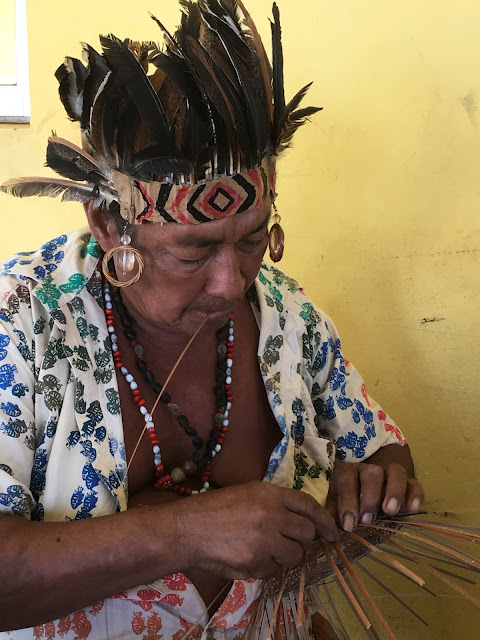Cannibal Myth
Before leaving Dominica we wanted to visit the Kalinago Indian Reserve on the rugged eastern shore of the island. After a long bus ride, we found ourselves sitting at the primary school on the reservation, listening to stories told by the local shaman and a former chief. The tribe hosted our group and feed us local fish, soups, and bread. They have rebuilt a typical Kalinago village and performed local dances and shared their artistry. A local reed plant is used to make a wide variety of baskets. Kel purchased two for Iolair.
This tribe of Indians shares much with our Native American tribes. They migrated to the Americas across the Siberia/Alaska land bridge, moved south toward Venezuela, and then began moving north again by boat into the Caribbean Islands. "Carib" actually means cannibal, but the tribal elder explained that it was not the case. He grinned as he looked across the well-fed tourists and said, "Today, I wish I was a cannibal."
In 1503, the Spanish decreed all the Carib Indians (a derogatory name; their original name is Kalinago) could be removed forcefully or sold into slavery. Their population across the Caribbean was destroyed, but the rugged coast of Dominica was a good place for them to hide. The flatter and drier islands, like Maria Gallante, produced greater quantities of sugar cane for rum, but Dominica was steep and wet and less ideal for the European's booming liquor business. There are still several massacre sites on the island, but the Kalinago Indians were able to survive.
All over the Americas, indigenous populations were destroyed by colonization and manifest destiny. It is not a new or unique story, but a constant reminder of the cost of our personal successes as Americans. Survival of the fittest? That's a poor excuse for what happened. The human spirit can see past this powerful force of nature and we owe a debt to the cultures that lost almost everything years ago. Easy to say, yet hard to do. I won't forget my conversation with Chief Garnet (chief from1998-2004). A cool wind was blowing off the Atlantic and rising up the cliff. We talked about history, homeland, his farm, and our children. We both work continuously to give our kids a fulfilled, healthy life. His 6 children are spread across Dominica and the US seeking both education and success. Sounds familiar, doesn't it?
This tribe of Indians shares much with our Native American tribes. They migrated to the Americas across the Siberia/Alaska land bridge, moved south toward Venezuela, and then began moving north again by boat into the Caribbean Islands. "Carib" actually means cannibal, but the tribal elder explained that it was not the case. He grinned as he looked across the well-fed tourists and said, "Today, I wish I was a cannibal."
In 1503, the Spanish decreed all the Carib Indians (a derogatory name; their original name is Kalinago) could be removed forcefully or sold into slavery. Their population across the Caribbean was destroyed, but the rugged coast of Dominica was a good place for them to hide. The flatter and drier islands, like Maria Gallante, produced greater quantities of sugar cane for rum, but Dominica was steep and wet and less ideal for the European's booming liquor business. There are still several massacre sites on the island, but the Kalinago Indians were able to survive.
All over the Americas, indigenous populations were destroyed by colonization and manifest destiny. It is not a new or unique story, but a constant reminder of the cost of our personal successes as Americans. Survival of the fittest? That's a poor excuse for what happened. The human spirit can see past this powerful force of nature and we owe a debt to the cultures that lost almost everything years ago. Easy to say, yet hard to do. I won't forget my conversation with Chief Garnet (chief from1998-2004). A cool wind was blowing off the Atlantic and rising up the cliff. We talked about history, homeland, his farm, and our children. We both work continuously to give our kids a fulfilled, healthy life. His 6 children are spread across Dominica and the US seeking both education and success. Sounds familiar, doesn't it?
 |
| A Rugged Dominican Refuge |




Enjoying traveling along with you, particularly learning the history of the places you visit. Always fun to see pics of you and Kelly...Praying for fair winds for you.
ReplyDeleteLove,
Don and Joyce
Hi there! Great to hear from you - hope all is well. We're loving life at sea and the adventures and experiences along the way. And it's wonderful to keep in touch with family! Remember -- you can always see where we are on the "tracking map" and show up anytime. We love visitors! Take care, Kelly and Ralf
Delete